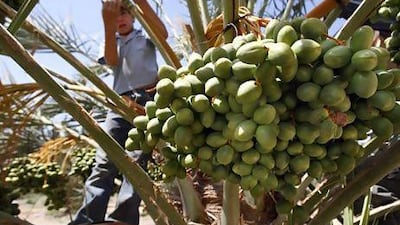JERICHO, WEST BANK // Zuhair Al Manasrah sat in his office where he manages plantations of 20,000 date palms and described the risk he took as a Palestinian investing in agriculture.
"It's difficult to farm anything when you're under occupation," said Mr Al Manasrah, 69, who spent stints as the governor of Bethlehem and Jenin before turning full-time to farming.
Despite the usual Israeli obstacles to nearly all things Palestinian in the West Bank's Jordan Valley, Mr Manasrah was optimistic. He took US$1.5 million (Dh5.51m) in loans from local banks to set up an industrial scale date-farming operation.
Yet seven years later, his company, Nakheel Palestine, is struggling to make money.
Palestinian agriculture in the West Bank has struggled under Israel's 46-year occupation. In the Jordan Valley, farmers say access to water is restricted and demolitions of Palestinian-owned structures are common.
Palestinian leaders envisage the Jordan Valley as the breadbasket of their hoped-for state, but the Palestinian Authority (PA) has little remit over the region. Israel directly administers about 90 per cent of the area and has lavished subsidised water, tax breaks and cheap land on its expanding agricultural settlements to maintain its grip. As a result, the settlers' farms have flourished and the Palestinian farmers cannot compete.
Mr Al Manasrah hopes his company will become the exception. He now exports dates around the world and has grown his company into one of the largest Palestinian-run date producers.
He plans to plant another 16,000 date palms and eventually produce about 2,000 tonnes of dates annually.
"We have markets where we can get good prices for our dates, where there are customers who buy Palestinian dates for a lot of different reasons," said Mr Al Manasrah.
He has been helped by the backing of influential Palestinian investors as well as rising European pressure against Israeli settlements and growing global demand for dates.
He exported about 60 per cent of his crop last year, primarily to buyers in Britain, Indonesia and Turkey.
Still, Nakheel Palestine pales in comparison to its Israeli competitors.
Israel controls about half the global market for Medjool dates, the preferred variety in the Muslim world that is consumed voraciously during Ramadan and other holidays. Of the 25,000 tonnes of dates Israel exported in 2011, nearly half came from Jewish settlements in the Jordan Valley, according to Who Profits, the Israeli watchdog of settlement companies.
The European Union (EU) imports 15 times more goods - primarily agricultural produce - from settlements than it does from Palestinians, according to statistics in a report issued last year by 21 non-government organisations. This despite a West Bank settler population of 300,000 compared to the territory's 2.5 million Palestinians, who have duty-free access to the EU market.
Palestinian farming, meanwhile, has nosedived. Since the Israel-Palestinian Oslo peace accords of the 1990s, agriculture has fallen from more than a quarter of Palestinian GDP to just under 6 per cent, according to Palestinian Authority statistics.
Access to water has been key to the decline. Many farmers are forced to bring it in by trucks. They say Israeli authorities prevent them from drilling deeper wells in the Jordan Valley and regularly demolish Palestinian cisterns in the West Bank.
Located in Israeli-administered areas, three structures in Mr Manasrah's date-palm orchards face Israeli-issued demolition orders. His company is waging an expensive legal battle against the orders.
All this translates into cheaper Israeli-grown dates and, Mr Al Manasrah acknowledges, tougher competition for his company, which still operates at a loss. "We hope this year will start to break even," he said.
Nakheel Palestine is not without its own support.
Its investors include the powerful Padico investment holding group, chaired by Palestinian billionaire Munib Al Masri. Their backing helped the company acquire the expensive equipment required for large-scale date production, including massive cooling facilities and a conveyor belt used to sort good dates from the bad.
Moreover, rising global demand for dates, especially in the Middle East, has helped some Palestinian farmers eke out a profit from the crop, said Christopher Whitman, advocacy coordinator at the Ramallah-based Maan Development Centre.
In Europe and Asia, pro-Palestinian buyers, distributors and boutique markets also help sustain companies such as Nakheel Palestine, Mr Whitman said. "These people are involved in fair-trade issues, people who buy organic fruit, buy goods that are not explicitly exploiting third-world countries, such as lower-class workers," he said.
European governments, for their part, have upped pressure on Israel over its occupation. Britain and Denmark have adopted product-labelling measures that identify whether something has been made in a settlement, and EU foreign ministers last May suggested imposing more measures.
Last year, South Africa's cabinet approved legislation to label settlment goods as coming from "the occupied Palestinian Territories".
Nakheel Palestine has no option other than to export its dates through Israeli ports. Israel controls all Palestinian commercial and passenger crossings. Mr Al Manasrah, a West Bank resident, lacks the permission required to travel with his produce into Israel before it is shipped abroad.
Such restrictions can cause Palestinian-grown fruits and vegetables to spoil before they can be exported, which Mr Al Manasrah said had led Palestinian farmers to turn to farming dates over the past decade. Dates require less water and have a far longer shelf life than the tomatoes, cucumbers and bananas that were once widely cultivated in the West Bank.
"The last option for Palestinian farms is dates, but even now that's become more complicated because of what Israel is doing to us," Mr Al Manasrah said.
But, he added, "there's still hope in the industry".

